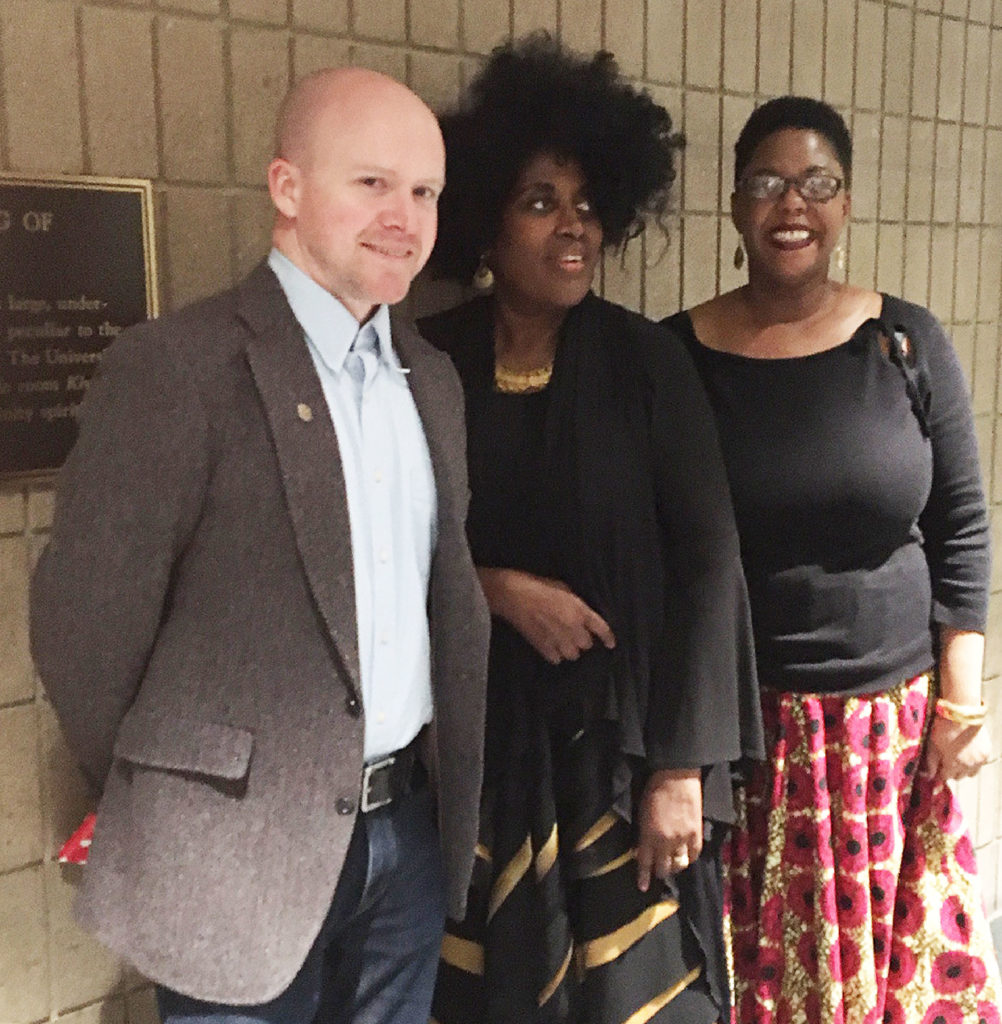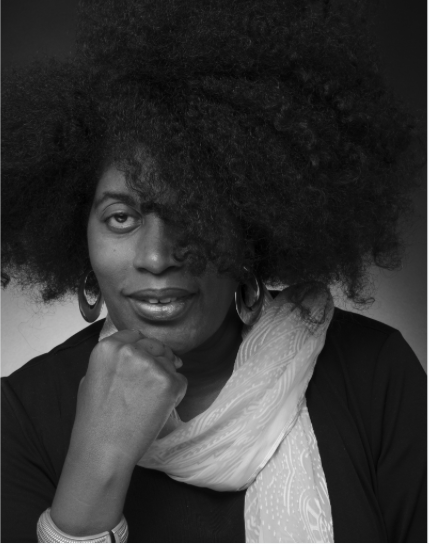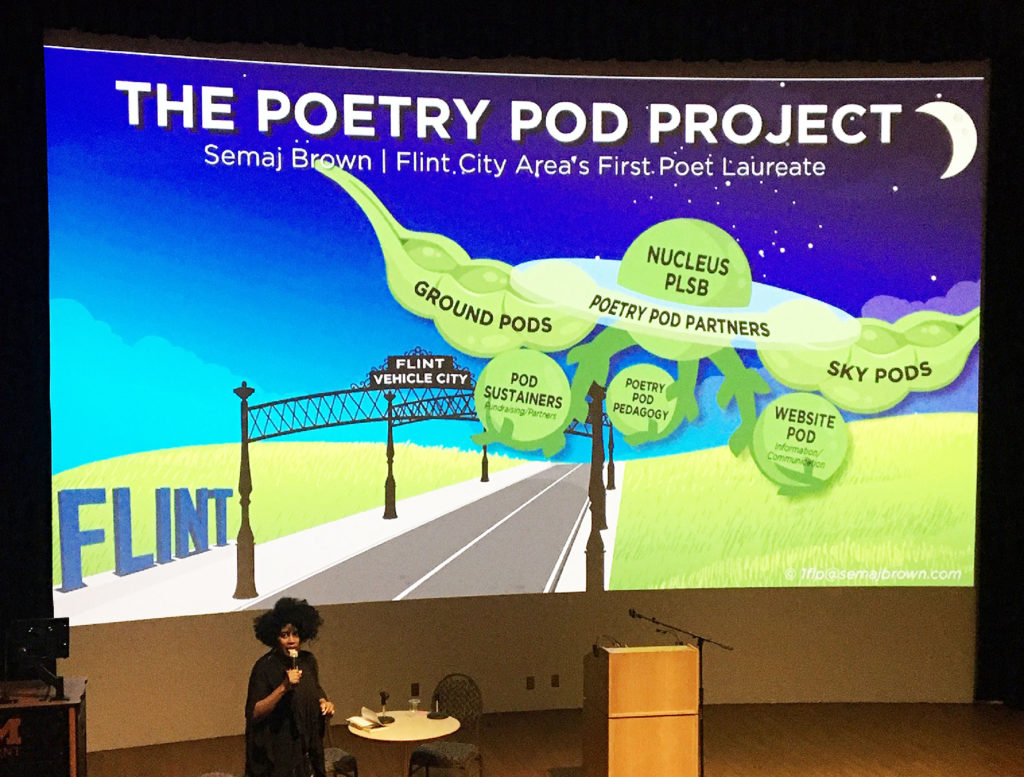By Patsy Isenberg
“Say Her Name.”
Semaj Brown. Flint’s first-ever poet laureate, made that powerful line one of her central refrains at a performance, discussion and launch of a literacy initiative at the University of Michigan – Flint’s Kiva Auditorium Nov. 13.
Brown had received a proclamation from then-Mayor Karen Weaver announcing her as Flint’s first poet laureate Sept. 27 after a performance at the Flint Public Library.
The UM event, sponsored by the UM-Flint English Department, was hosted by linguistics professor Erica Britt and about 30 people braved icy weather to attend. Brown read several of her poems and responded to questions by Britt. She also took questions from audience members after the reading.
Brown said her 2018 book, Bleeding Fire: Tap the Eternal Spring of Regenerative Light, came about because of encouragement from her husband, Dr. James Brown, a Flint family physician. Reading from the dedication in the book, she said “He was persistent. He cajoled and encouraged and nurtured this idea, offering arguments and explanations as to why this was the thing to do, now.”

Flint Poet Laureate Semaj Brown (center) with UM – Flint English Department Chair James Schirmer and Professor Erica Britt (Photo by Patsy Isenberg)
Sitting beside her onstage, Brittt encouraged Brown to talk about her childhood, her inspirations, writing processes, and her marriage. Brown said she and her husband “saved each other’s lives” and described their relationship as a “Black Love Galaxy.”
Brown read a few of her poems, some by request from Britt.

Semaj Brown’s portrait from the Flint Institute of Arts exhibit Women of a New Tribe, photo by Jerry Taliaferro, 2016, Digital print © Jerry Taliaferro. Used by permission of the Flint Institute of Arts.
The poems are dense with colorful poetic images, one after the other. One was her epic “Making of a New Tribe,” inspired by the 2017 photo portrait exhibit at the Flint Institute of Arts. To declaim it, she stood up and remained standing throughout the rest of the event. In the poem she uses two voices, one a young girl addressing the ocean softly. The other, the voice of the ocean, is much louder, and emphatic. It begins with the girl:
“I talked to the ocean.
“I asked Mother Ocean how long, how long after middle passage did it take to heal your daughters, make them whole? How did you create this distinct beautiful creation?”
The answer to the child’s question takes several minutes and there’s much rhythmic repetition, almost maniacal at times, with the child repeating her question.
The ocean answers, about her creation,
“standing in boardrooms … in courtrooms … in legislatures … in hospitals … on street corners … in shelters … in uniform … in science … in educational institutions … as artists … athletes … entrepreneurs … at counters … in kitchens … with blue collars with white collars … in service … as waitresses … and secretaries … in wealth and affluence … in poverty … standing on her knees in poverty … in prayer in churches … in mosque … in synagogs … on her knees praying at the alters of indigenous ritual … standing with humanity … standing up up … grandmothers and grandchildren … standing up up … standing, standing, standing … as unlikely activists in Lansing capitol against state-sponsored poisoning of one hundred thousand Flint residents! … SAY HER NAME!”
The imperative “Say Her Name!” is repeated many times. And indeed, many notable black women are named, including Nina Simone, Oprah, Harriet Tubman, Dr. Edith Spencer, Gloria House, and Michele Obama, just to name a few. She calls it “black girl magic.”
She speaks the language of an African American woman and often inserts historical references to the harsh oppression experienced by African Americans in her work. But her writing is overall positive and encouraging. She includes scientific metaphors too, drawing from astronomy, water and fire frequently, especially fire.
Brown credited her mother, Bessie L. James, with giving her a very early and unrelenting exposure to literature, music, science and social understanding. A Detroit native, she holds a degree in biological sciences from Wayne State University and has done post-graduate work in literature, writing and education. She also plays the violin. She noted that she has used all those skills during her diverse and wide-ranging career.
She has performed for audiences many times throughout her career, and her readings also been recorded. She collaborated with her husband on “Onion Revolt,” a one-woman comedy where vegetables become activists and rock stars. “Onion Revolt” was performed at Bower Theatre for Flint Youth Theatre in 2014. Dr. Brown, who often appears with her, composed the music.
The Poetry Pod Project addresses literacy issues among Flint children
After the readings, Brown described what she intends to do as Flint’s first poet laureate. Britt invited her to present her “amazing plan.” Brown noted that in the past, “Poet laureates would sometimes write a poem and show up at special events and read their poem.”

Brown unveiling her “Poetry Pod” plan at UM – Flint (Photo by Patsy Isenberg)
But Brown expects to do more than that. She has a “platform” built out of concern about worrisome literacy scores among Flint children.
She said she was astonished to learn that the 2018 literacy scores just released for third graders in Flint showed a 75 percent drop compared to five years ago before the onset of the water crisis.
“So there goes fourth grade and fifth grade,” she said. “We have a huge crisis, but we can do something about it.”
She unveiled the organization of her plan for what she is christening ” The Poetry Pod Project.” She said it’s in the early stages of development and she’s seeking partners — so far, the Flint Institute of Arts and The Courier publication are on board as co-sponsors.
She said she hopes kids and their parents will be motivated to spend more time improving their reading and writing skills and be drawn to poetry. She’s asking for volunteers, both individuals and organizations, to help–particularly other writers and poets. Part of the plan will include meeting up with kids and reading to them, but she said she also wants to develop “lessons” to be available digitally, online or in podcasts.
To find out more about volunteering or getting kids involved in the project, Brown can be contacted by email at 1plflint@semajbrown.com.
EVM Staff Writer Patsy Isenberg can be reached at pisenber@gmail.com.


You must be logged in to post a comment.